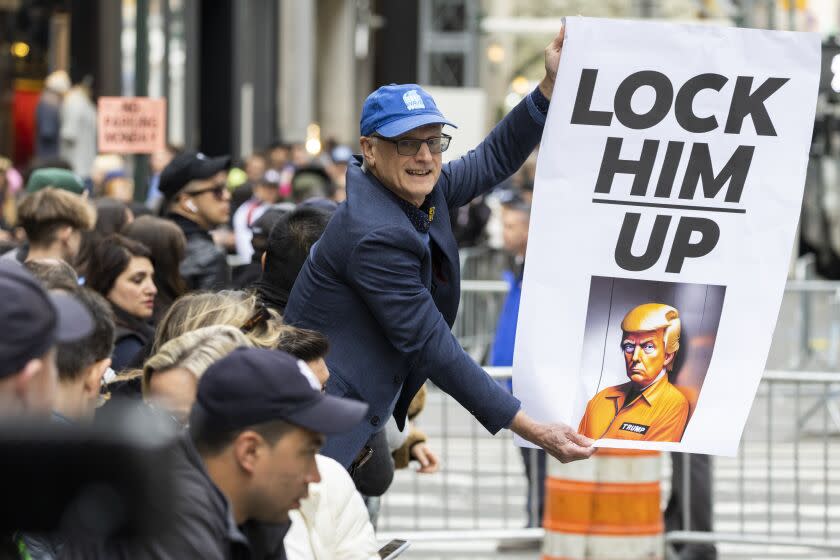Granderson: It's not wrong to take satisfaction in Trump's day in court

- Oops!Something went wrong.Please try again later.
- Oops!Something went wrong.Please try again later.
- Oops!Something went wrong.Please try again later.
"This seems to be more about the person than about the crime."
-Sen. Bill Cassidy (R-La.)
The senator's raising the right question. As the legal drama surrounding Donald Trump continues to unfold after he pleaded not guilty to those 34 charges in court in New York on Tuesday, it’s important that this historic spectacle not overshadow the moral question. The nation can survive the indictment of a former president as long as it happens in pursuit of justice rather than revenge.
So let’s talk about revenge. Let's talk about what it looks like when a government investigation is "more about the person than about the crime." Our own House Speaker Kevin McCarthy helpfully draws the contrast.
Here's what he had to say about the prosecutor in New York: “Alvin Bragg has irreparably damaged our country in an attempt to interfere in our presidential election.”
Oh? When Manhattan Dist. Atty. Bragg described the case on Tuesday, it sounded a lot like business as usual for his office: "At its core, this case today is one with allegations like so many of our white-collar cases. Allegations that someone lied, again and again, to protect their interests and evade the laws to which we are all held accountable." A grand jury considered the evidence and concluded that Trump should be charged with 34 felony counts of falsifying business records, in connection with hush money paid during the 2016 presidential campaign to the porn actress Stormy Daniels.
The allegation is that Trump and his company falsely reported the hush money as a payment for legal services, rather than as reimbursement to the lawyer who paid Daniels. Specifically, 11 counts are related to invoices from the lawyer, 11 related to checks from Trump and 12 related to ledger entries.
The people bringing these charges sure do seem to focus on the crime more than on the person.
But you don't have to look far to find an example of that very real problem Cassidy and McCarthy describe — situations in which a government investigation really is "more about the person than about the crime," and is indeed "an attempt to interfere in our presidential election.”
Take it from McCarthy, who crowed in 2015 about how House Republicans pulled this off: “Everybody thought Hillary Clinton was unbeatable, right? But we put together a Benghazi special committee, a select committee. What are her numbers today? Her numbers are dropping. Why? Because she’s untrustable. But no one would have known any of that had happened had we not fought.”
The Republican-led Select Committee on Benghazi spent two years and nearly $8 million investigating Clinton. Its purpose wasn't subtle. The terrorist attack had already been investigated numerous times. The FBI had decided years before not to file charges. But Trump’s unofficial campaign slogan was “lock her up.”
The two-year investigation found no wrongdoing. So House leaders held off on announcing that it was pointless, because they aimed to inflict maximum damage on Clinton's presidential campaign.
“Republicans voted on this partisan report five months ago, but delayed filing it and completing the committee until after the election,” the late Rep. Elijah Cummings (D-Md.) said afterward.
Ouch. So that's the kind of "weaponizing" that we should be afraid of. Not a district attorney prosecuting crimes.
Thomas Paine, the philosopher-founder, once articulated a key difference between society and government. He wrote: “for when we suffer, or are exposed to the same miseries by a government, which we might expect in a country without government, our calamity is heightened by reflecting that we furnish the means by which we suffer.” I can only imagine what he would have said about a branch of government using an investigation to target a political rival.
The House Republicans' Benghazi investigation lasted longer than the ones for Watergate and the 9/11 attacks. It lasted longer than the one for the Jan. 6 attack on the U.S. Capitol. Republicans could have wrapped up the Benghazi committee in June 2016. They waited until January 2017, using the specter of an ongoing investigation over Clinton like a dark cloud. It was an egregious abuse of power. One Americans would do well in remembering as our young country embarks on new territory: accountability.
The fact that no other president has been indicted should not be conflated with all other presidents being innocent of crimes. American exceptionalism doesn’t require perfection, just the belief our country is the closest to it. Sometimes that means overlooking a few details like Gerald Ford pardoning Richard Nixon to keep our record without blemish. But now that our young country is at this crossroad, we must, in the words of Sen. Cassidy, decide: Is it about the crime or the person?
As much as I don’t like President Trump, I think the case against him in New York is about crimes and the pursuit of justice. I hope the same for the other investigations closing in on him.
Weaponizing the government to persecute political foes is something Trump would do. Something he wanted to do and tried to do. Something his allies in Congress practiced as well. So we know what it looks like.
And watching the case in New York, we know this isn't that.
This story originally appeared in Los Angeles Times.

